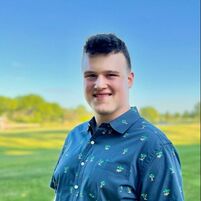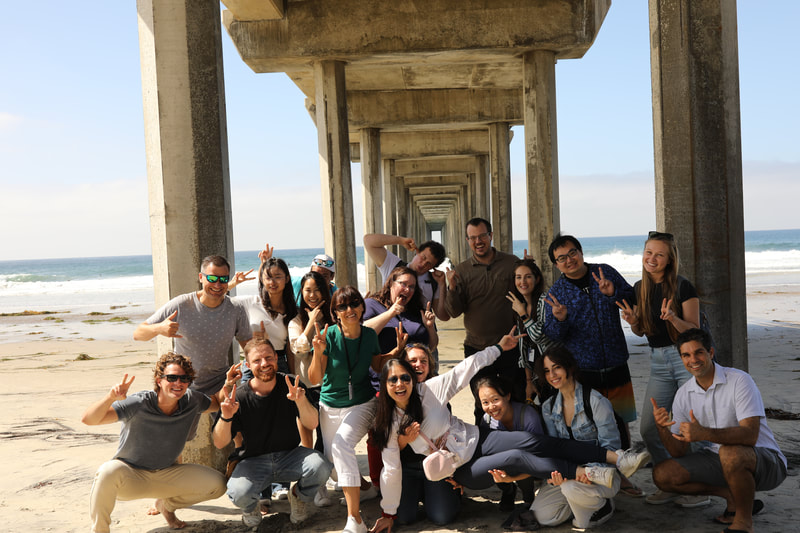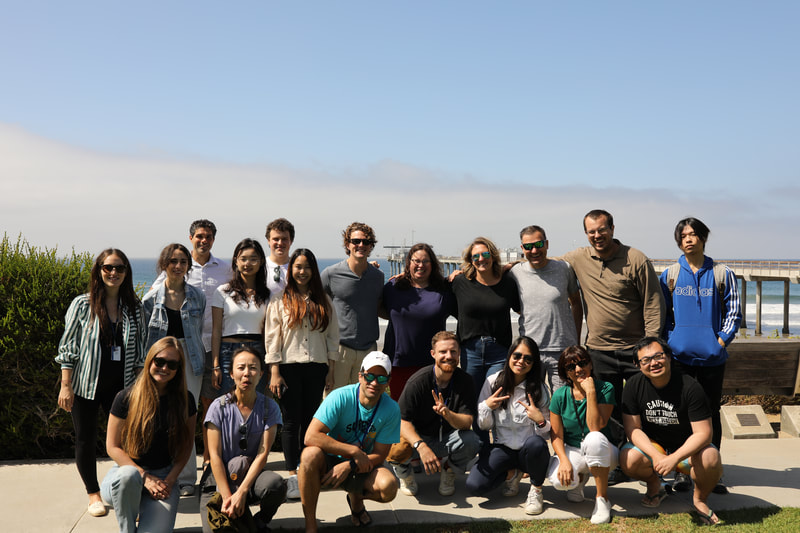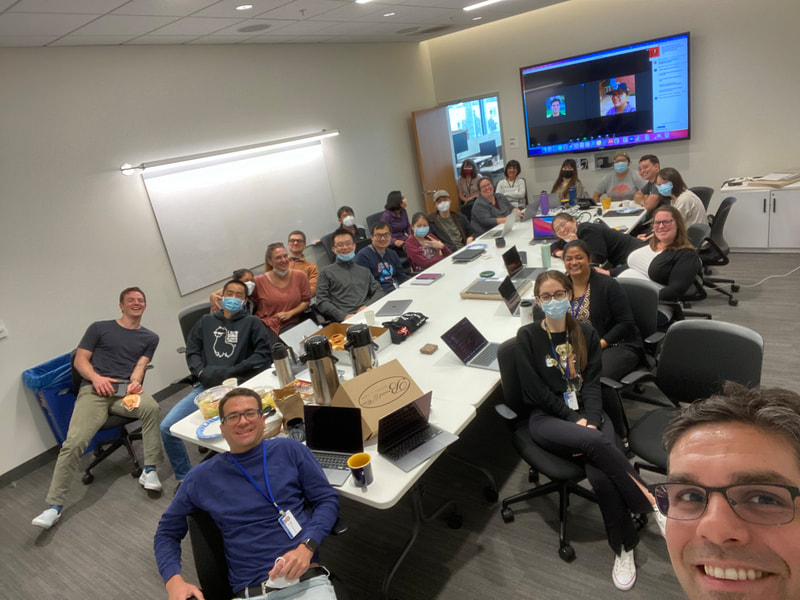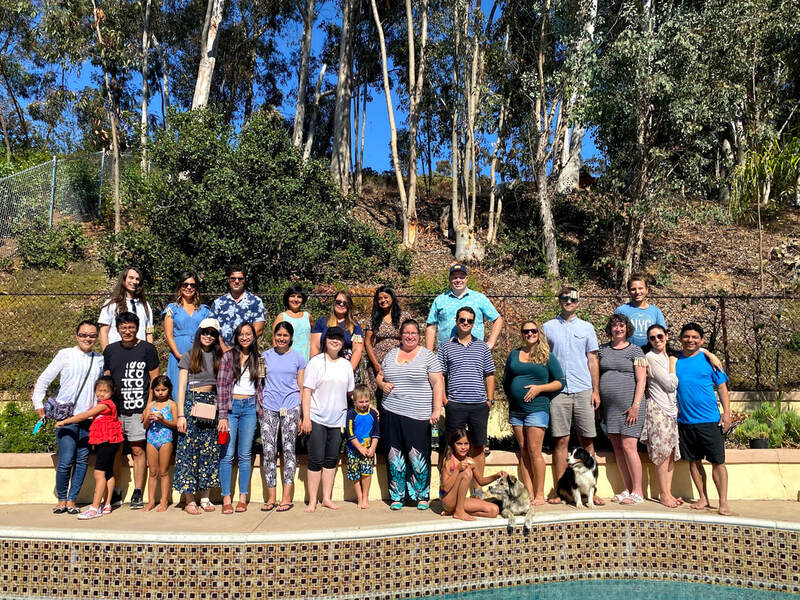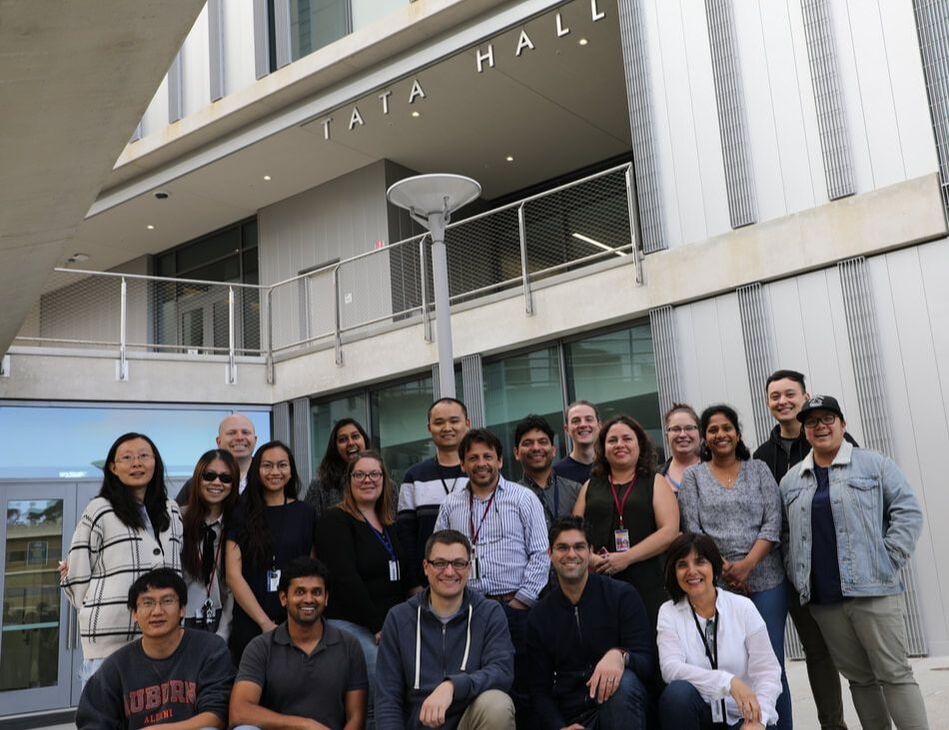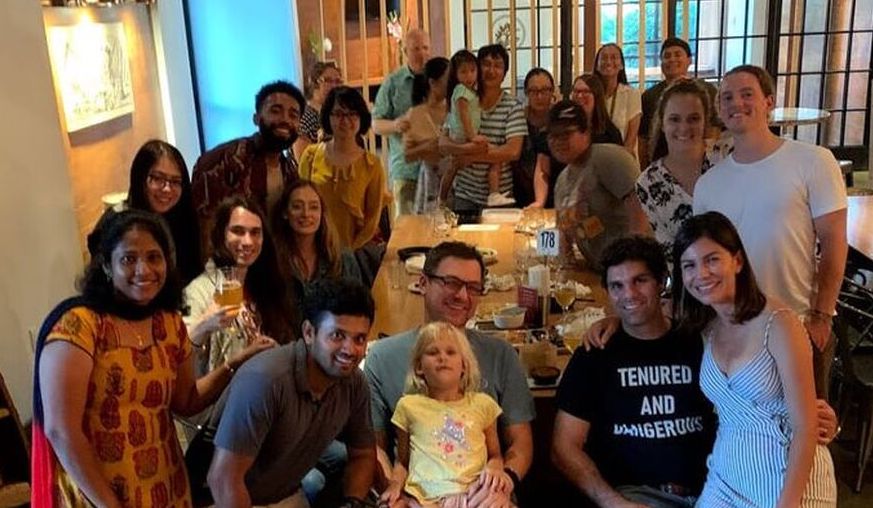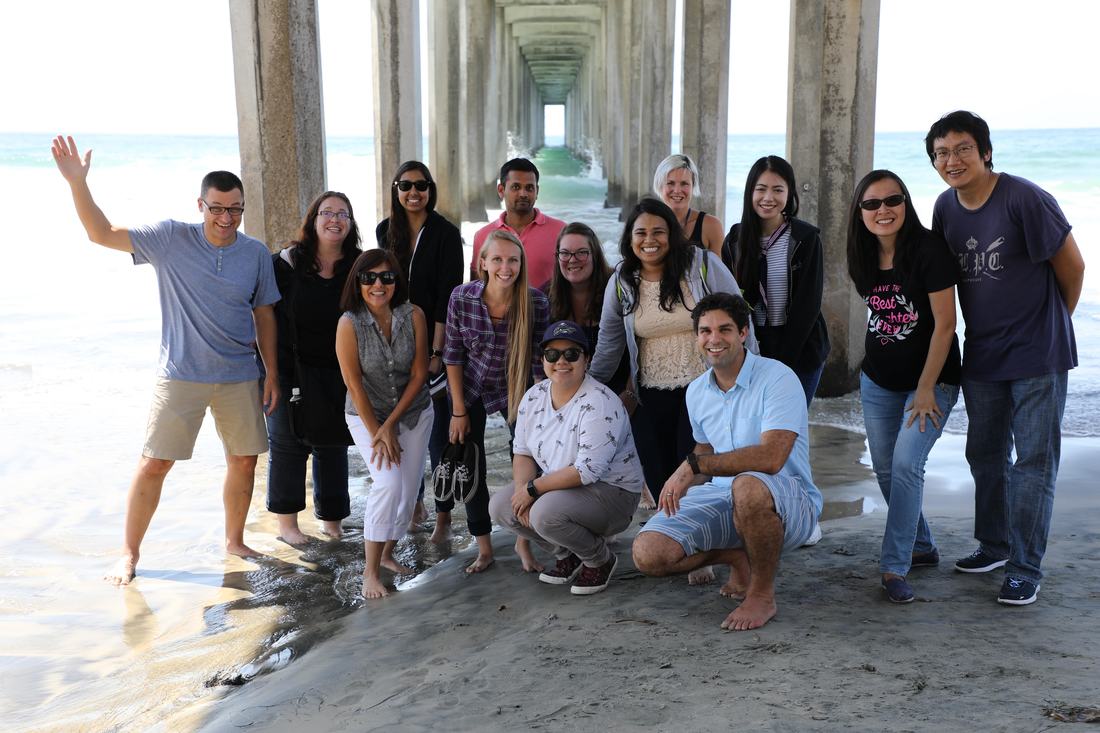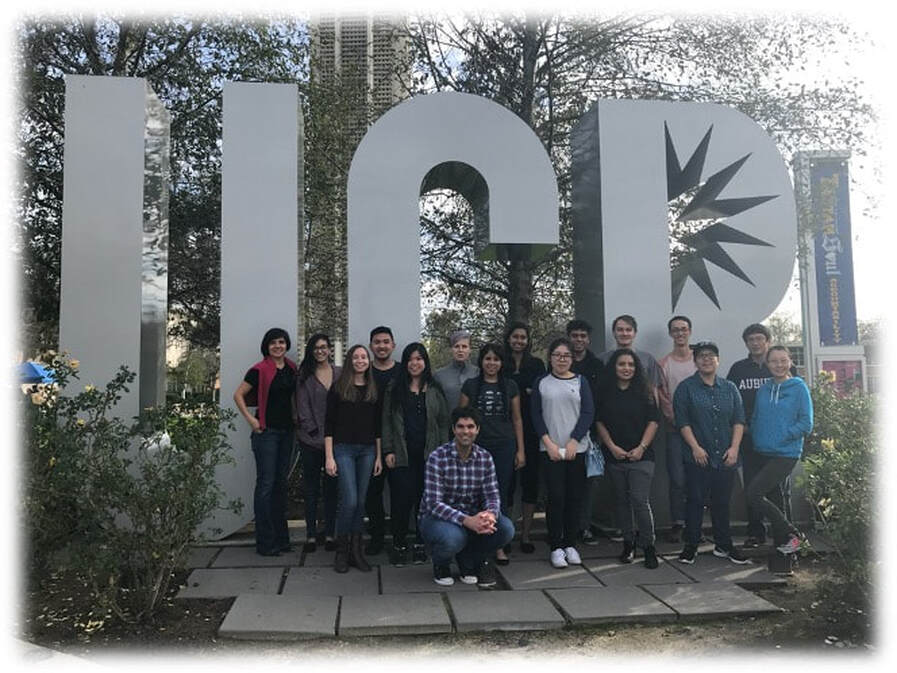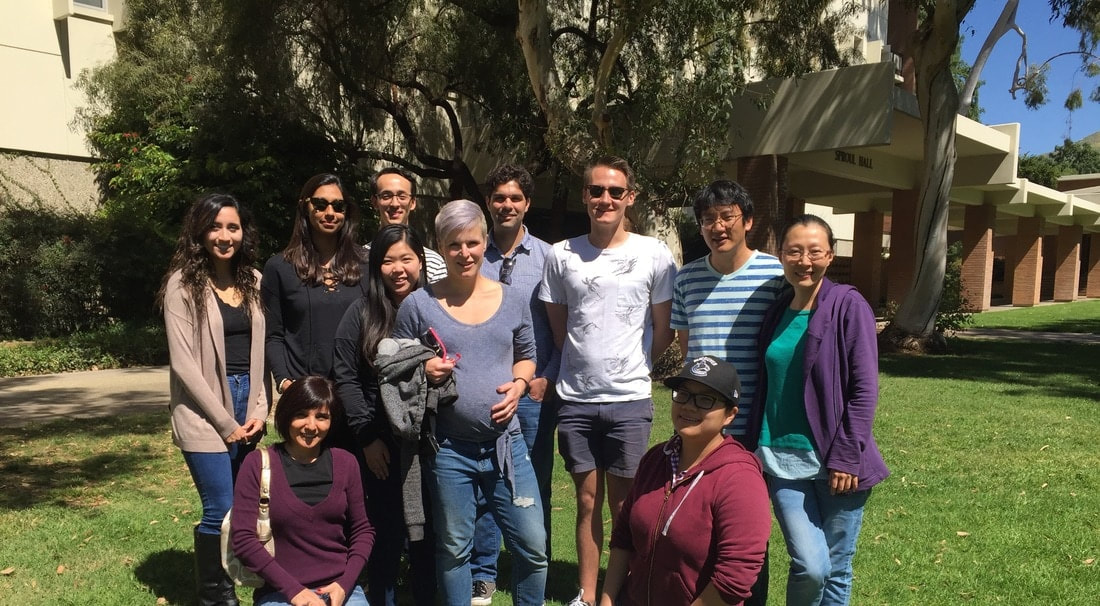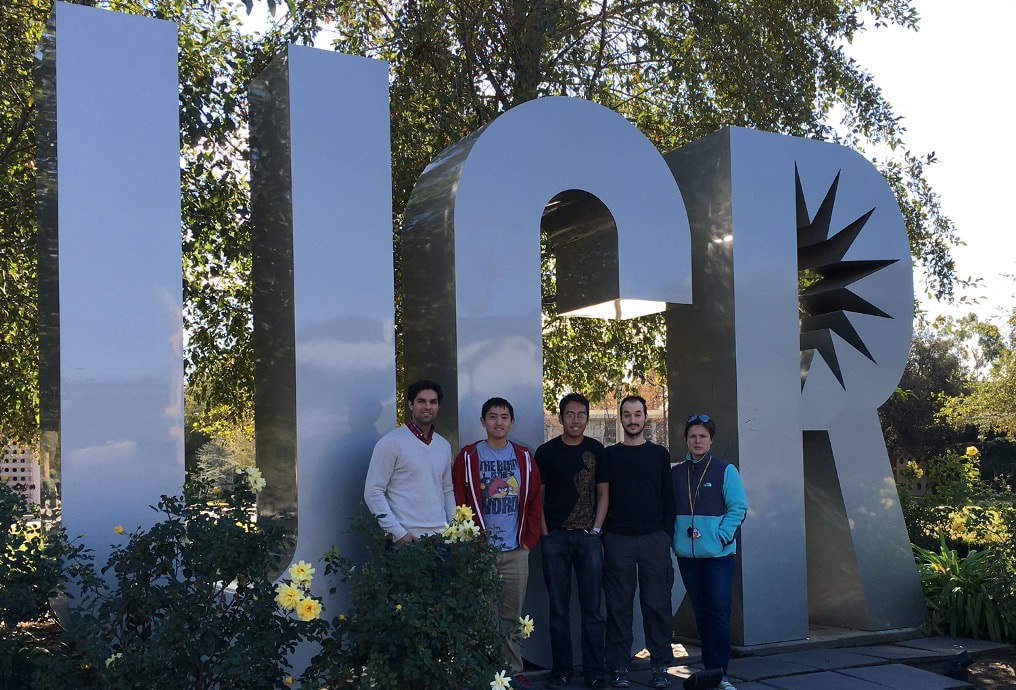|
Omar Akbari received a B.S./M.S. in Biotechnology from the University of Nevada, Reno in May 2005. In December of 2008, he received a Ph.D. in Cell and Molecular Biology from the University of Nevada, Reno where he studied transcriptional regulation during development while working with professors Robert Drewell and Chi-Yun Pai. He then joined the laboratory of professor Bruce A. Hay at the California Institute of Technology as a senior postdoctoral scholar where he used principles of synthetic biology to develop population control technologies for animals. In 2015, he became an Assistant Professor of Entomology in the Center for Infectious Disease Vector Research (CIDVR) at the University of California, Riverside. In fall of 2017, he then joined the faculty as an Assistant Professor in the Department of Cell and Developmental Biology, within the School of Biological Sciences, at the University of California, San Diego. In 2018 he co-founded Agragene a biotechnology based startup. In 2019 he was promoted to Associate Professor (with Tenure), followed by a promotion to Professor in 2021. In 2022, he co-founded Synvect a biotechnology based startup in San Diego, CA.
|
Principal Investigator
Omar S. Akbari, Ph.D. Professor School of Biological Sciences Department of Cell and Developmental Biology University of California, San Diego Link to UCSD Profile Link to Linkedin Profile Link to ResearchGate Profile Link to Twitter Profile Link to ORCID Link to Google Scholar Link to PubMed Articles Mailing Address: University of California, San Diego 9500 Gilman Drive MC 0335 5101 TATA Hall La Jolla, CA 92093 United States of America Office Phone: +1 (858) 246-0640 Email Address: [email protected] Office Location: 5101 Tata Hall Lab Location: 5th floor Tata Hall Click here for current CV |
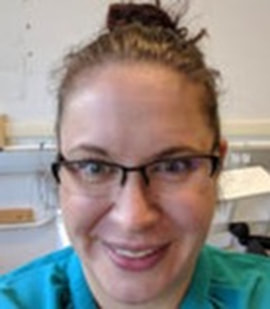 Robyn Raban, Ph.D.
Robyn Raban, Ph.D.
Research Data Analyst
Robyn Raban received her B.S. in Environmental Science/Ecology from UC Berkeley. She also received an M.S. in Entomology from the University of Florida and a Ph.D. in Microbiology, Immunology and Pathology from Colorado State University. Before joining the Akbari lab in 2017, she worked in industry and academia as a project manager, scientist and grant writer.
Contact: [email protected] Phone: (858) 246-2066 Google Scholar Click here for current CV
Robyn Raban received her B.S. in Environmental Science/Ecology from UC Berkeley. She also received an M.S. in Entomology from the University of Florida and a Ph.D. in Microbiology, Immunology and Pathology from Colorado State University. Before joining the Akbari lab in 2017, she worked in industry and academia as a project manager, scientist and grant writer.
Contact: [email protected] Phone: (858) 246-2066 Google Scholar Click here for current CV
 Judy Della Rocca
Judy Della Rocca
Staff Research Associate (SRA)
Judy Della Rocca joined the Akbari Lab in 2016 and is currently the head Lab Technician of the Akbari mosquito insectary space. Her work is the maintenance and rearing of wildtype and transgenic Aedes and Anopheles mosquitos.
Contact: [email protected]
Judy Della Rocca joined the Akbari Lab in 2016 and is currently the head Lab Technician of the Akbari mosquito insectary space. Her work is the maintenance and rearing of wildtype and transgenic Aedes and Anopheles mosquitos.
Contact: [email protected]
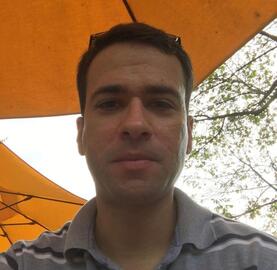 Iliano Coutinho-Abreu, Ph.D.
Iliano Coutinho-Abreu, Ph.D.
Staff Research Associate (SRA)
Iliano Coutinho-Abreu received his B.S. in Biology and M.S. in Genetics from the Federal University of Pernambuco (Brazil). In 2011, Iliano Coutinho-Abreu finished his PhD in Entomology at Kansas State University, with the dissertation entitled “Molecular aspects of sand fly-based vaccine development”. In the same year, Dr. Coutinho-Abreu joined the Ray Lab at UC Riverside as a postdoc to investigate the olfactory systems of the Asian citrus psyllid and mosquitoes for the development of odor-based control methods. In 2014, Dr. Coutinho-Abreu moved to the Valenzuela Lab at NIH and as a postdoc studied Leishmania-sand fly molecular interaction, the evolution of salivary proteins, and the development of saliva-based vaccines. As a SRA in the Akbari Lab at UCSD since September 2020, Dr. Coutinho-Abreu has been working on the development of novel genetic strategies for the control of insect disease vectors.
Contact: [email protected] Google Scholar
Iliano Coutinho-Abreu received his B.S. in Biology and M.S. in Genetics from the Federal University of Pernambuco (Brazil). In 2011, Iliano Coutinho-Abreu finished his PhD in Entomology at Kansas State University, with the dissertation entitled “Molecular aspects of sand fly-based vaccine development”. In the same year, Dr. Coutinho-Abreu joined the Ray Lab at UC Riverside as a postdoc to investigate the olfactory systems of the Asian citrus psyllid and mosquitoes for the development of odor-based control methods. In 2014, Dr. Coutinho-Abreu moved to the Valenzuela Lab at NIH and as a postdoc studied Leishmania-sand fly molecular interaction, the evolution of salivary proteins, and the development of saliva-based vaccines. As a SRA in the Akbari Lab at UCSD since September 2020, Dr. Coutinho-Abreu has been working on the development of novel genetic strategies for the control of insect disease vectors.
Contact: [email protected] Google Scholar
 Andie Smidler, Ph.D.
Andie Smidler, Ph.D.
Postdoctoral Scholar
Andie (Andrea) Smidler received her B.S. in Biology from the University of North Carolina – Chapel Hill in 2011, where she completed her honors thesis on the topic of plant cell death. Soon after, she became interested in using GM technologies to control vector-borne disease and began research on the topic at the University of Strasbourg, France. While there she earned her M.Res, and pioneered the use of TAL-endonucleases to create targeted gene knockouts in Anopheles gambiae. After returning to the US, she pursued a Ph.D. at Harvard University jointly between the Flaminia Catteruccia and George Church Labs, and graduated in 2019. Her dissertation research focused on developing transgenic tools for vector control, including CRISPR-based gene drive and genetic sterilization technologies, a line of research she is continuing at UCSD.
Contact: [email protected] Google Scholar
Andie (Andrea) Smidler received her B.S. in Biology from the University of North Carolina – Chapel Hill in 2011, where she completed her honors thesis on the topic of plant cell death. Soon after, she became interested in using GM technologies to control vector-borne disease and began research on the topic at the University of Strasbourg, France. While there she earned her M.Res, and pioneered the use of TAL-endonucleases to create targeted gene knockouts in Anopheles gambiae. After returning to the US, she pursued a Ph.D. at Harvard University jointly between the Flaminia Catteruccia and George Church Labs, and graduated in 2019. Her dissertation research focused on developing transgenic tools for vector control, including CRISPR-based gene drive and genetic sterilization technologies, a line of research she is continuing at UCSD.
Contact: [email protected] Google Scholar
 Hsing-Han (Jade) Li, Ph.D.
Hsing-Han (Jade) Li, Ph.D.
Postdoctoral Scholar
Hsing-Han (Jade) received her B.S in Department of Biotechnology (2010) at Asia University, Taiwan, and M.S. in Institute of Biological Science and Technology (2012) at the China Medical University, Taiwan, Ph.D. in Institution of Biotechnology Science and Technology (2020) at National Tsing Hua University, Taiwan, while working with Chun-Hong Chen at the National Institute of Infectious Disease and Vaccinology at the National Health Research Institute (NHRI) in Taiwan. During her Ph.D. she worked on using CRISPR in mosquitoes. She joined the Akbari lab in late 2021 and is interested in working on gene-editing transgenic tools for vector-borne disease and pest control, including CRISPR-based gene drive technologies.
Contact: [email protected]
Hsing-Han (Jade) received her B.S in Department of Biotechnology (2010) at Asia University, Taiwan, and M.S. in Institute of Biological Science and Technology (2012) at the China Medical University, Taiwan, Ph.D. in Institution of Biotechnology Science and Technology (2020) at National Tsing Hua University, Taiwan, while working with Chun-Hong Chen at the National Institute of Infectious Disease and Vaccinology at the National Health Research Institute (NHRI) in Taiwan. During her Ph.D. she worked on using CRISPR in mosquitoes. She joined the Akbari lab in late 2021 and is interested in working on gene-editing transgenic tools for vector-borne disease and pest control, including CRISPR-based gene drive technologies.
Contact: [email protected]
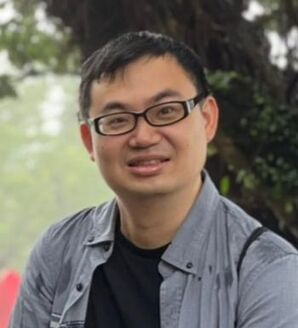 Shih-Che Weng, Ph.D.
Shih-Che Weng, Ph.D.
Postdoctoral Scholar
Shih-Che Weng received his B.S. in Life Sciences from the National Dong Hwa University, Taiwan at 2011 and M.S. in Microbiology from the National Taiwan University at 2013. Soon after, he joined Dr. Shin-Hong Shiao’s Lab as a research assistant (2013-2014) and became interested in the study of developmental biology of mosquitoes and vector-pathogen interactions. After that, he applied for the Ph. D. program in the National Taiwan University under supervision of Dr. Shiao and graduated in 2020. His dissertation research involved two major directions: (1) molecular signaling of reproduction control in the mosquitoes. (2) arbovirus-mosquito interactions and characterization of mosquito host factors on arbovirus transmission. In the Akbari lab, Shih-Che would like to focus on developing transgenic tools for molecular virology and vector control, and investigating the olfactory physiology of blood-feeding vector mosquitoes.
Contact: [email protected] Google Scholar
Shih-Che Weng received his B.S. in Life Sciences from the National Dong Hwa University, Taiwan at 2011 and M.S. in Microbiology from the National Taiwan University at 2013. Soon after, he joined Dr. Shin-Hong Shiao’s Lab as a research assistant (2013-2014) and became interested in the study of developmental biology of mosquitoes and vector-pathogen interactions. After that, he applied for the Ph. D. program in the National Taiwan University under supervision of Dr. Shiao and graduated in 2020. His dissertation research involved two major directions: (1) molecular signaling of reproduction control in the mosquitoes. (2) arbovirus-mosquito interactions and characterization of mosquito host factors on arbovirus transmission. In the Akbari lab, Shih-Che would like to focus on developing transgenic tools for molecular virology and vector control, and investigating the olfactory physiology of blood-feeding vector mosquitoes.
Contact: [email protected] Google Scholar
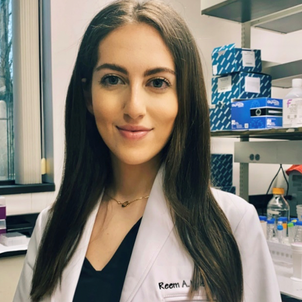 Reem Masri, Ph.D.
Reem Masri, Ph.D.
Postdoctoral Scholar
Reem Masri received her B.S. (2013) and M.S. (2016) in Biology from the American University of Beirut. Her thesis focused on pyrethroid resistance in the house mosquito, Culex pipiens. She then obtained my Ph.D. in Entomology from Virginia Tech in 2021 working in the lab of Dr. Sharakhova. During her time at Virginia Tech, she optimized a new gene-based method for the cytogenetics mapping of repeat-rich mosquito genomes. Moreover, she had the chance to study whole-genome and chromosome differentiation between members of the Culex pipiens complex, specifically Cx. p. pipiens and Cx. p. molestus.
Contact: [email protected]
Reem Masri received her B.S. (2013) and M.S. (2016) in Biology from the American University of Beirut. Her thesis focused on pyrethroid resistance in the house mosquito, Culex pipiens. She then obtained my Ph.D. in Entomology from Virginia Tech in 2021 working in the lab of Dr. Sharakhova. During her time at Virginia Tech, she optimized a new gene-based method for the cytogenetics mapping of repeat-rich mosquito genomes. Moreover, she had the chance to study whole-genome and chromosome differentiation between members of the Culex pipiens complex, specifically Cx. p. pipiens and Cx. p. molestus.
Contact: [email protected]
 Fangying Chen, Ph.D.
Fangying Chen, Ph.D.
Postdoctoral Scholar
Fangying Chen is from Inner Mongolia, China. She received her B.S. of Plant Protection and M.S of Agricultural Insects and Pest Control in the Northwest A&F University, China. Fangying then went to the Netherlands and obtained her Ph.D. at the University of Groningen. At the end of 2021, she will continue her research as a postdoctoral scholar in the Akbari lab and use gene-editing tools to answer applied biological questions. She will be joining the Akbari Lab - December 2021.
Contact: [email protected]
Fangying Chen is from Inner Mongolia, China. She received her B.S. of Plant Protection and M.S of Agricultural Insects and Pest Control in the Northwest A&F University, China. Fangying then went to the Netherlands and obtained her Ph.D. at the University of Groningen. At the end of 2021, she will continue her research as a postdoctoral scholar in the Akbari lab and use gene-editing tools to answer applied biological questions. She will be joining the Akbari Lab - December 2021.
Contact: [email protected]
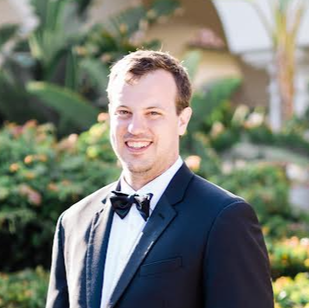 William Gendron, Ph.D.
William Gendron, Ph.D.
Postdoctoral Scholar
William A. C. Gendron received his B.S. in Biology from Loyola Marymount University in 2015. He obtained his Ph.D. in Biomedical Sciences from the Virology and Gene Therapy Track of Mayo Clinic in 2021. His thesis work in the Barry Lab consisted of developing methods to track gene editing non-invasively in vivo for monitoring CRISPR delivery, developing enhanced DNA insertion methods for gene therapy and designing novel gene therapies. William is interested in developing novel insect suppression systems and gene drive technologies. William Joined the Akbari Lab in July 2022.
Contact: [email protected]
William A. C. Gendron received his B.S. in Biology from Loyola Marymount University in 2015. He obtained his Ph.D. in Biomedical Sciences from the Virology and Gene Therapy Track of Mayo Clinic in 2021. His thesis work in the Barry Lab consisted of developing methods to track gene editing non-invasively in vivo for monitoring CRISPR delivery, developing enhanced DNA insertion methods for gene therapy and designing novel gene therapies. William is interested in developing novel insect suppression systems and gene drive technologies. William Joined the Akbari Lab in July 2022.
Contact: [email protected]
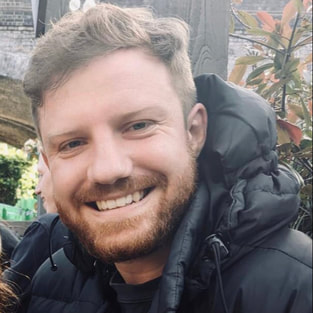 Rhodri Edwards, Ph.D.
Rhodri Edwards, Ph.D.
Postdoctoral Scholar
Rhodri completed his BSc in Biology from the University of Bristol (UK, 2015), before completing his MSc in Medical Entomology for Disease Control at the London School of Hygiene and Tropical Medicine (LSHTM, UK, 2017). He obtained his PhD from LSHTM (2023) with a focus on developing genetic modification of olfactory genes in L.longipalpis and P.papatasi sand fly vectors of Leishmaniasis. Rhodri previously worked with the Oxford Silk Group (University of Oxford, UK) and Oxford Biomaterials towards the development of medical products utilising reconstituted B. mori silk dope. He worked at Oxitec Ltd (UK) on mass production of agricultural insect pests towards control, and on the evaluation of Malaria control products at Centre de Recherche Entomologique de Cotonou (Benin). Rhodri joined the Akbari Lab in April of 2023.
Contact: [email protected]
Rhodri completed his BSc in Biology from the University of Bristol (UK, 2015), before completing his MSc in Medical Entomology for Disease Control at the London School of Hygiene and Tropical Medicine (LSHTM, UK, 2017). He obtained his PhD from LSHTM (2023) with a focus on developing genetic modification of olfactory genes in L.longipalpis and P.papatasi sand fly vectors of Leishmaniasis. Rhodri previously worked with the Oxford Silk Group (University of Oxford, UK) and Oxford Biomaterials towards the development of medical products utilising reconstituted B. mori silk dope. He worked at Oxitec Ltd (UK) on mass production of agricultural insect pests towards control, and on the evaluation of Malaria control products at Centre de Recherche Entomologique de Cotonou (Benin). Rhodri joined the Akbari Lab in April of 2023.
Contact: [email protected]
 Junru Liu, B.S.
Junru Liu, B.S.
Graduate Student (Ph.D)
Junru Liu received her B.S. in Human Biology from the University of California, San Diego (2018). She worked as a student researcher in the lab of Dr. Newmeyer in La Jolla Institute for Allergy and Immunology studying the apoptosis cascade in liver cancer cells (2017-2018). Junru joined the Akbari Lab in 2018 and is currently focusing on developing gene-editing technologies for vector-borne disease and pest control.
Contact: [email protected] Click here for current CV
Junru Liu received her B.S. in Human Biology from the University of California, San Diego (2018). She worked as a student researcher in the lab of Dr. Newmeyer in La Jolla Institute for Allergy and Immunology studying the apoptosis cascade in liver cancer cells (2017-2018). Junru joined the Akbari Lab in 2018 and is currently focusing on developing gene-editing technologies for vector-borne disease and pest control.
Contact: [email protected] Click here for current CV
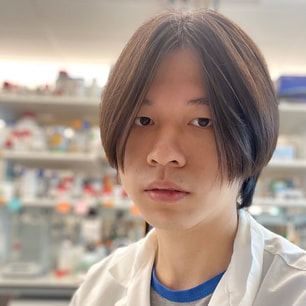 Hongxin Cai, B.S.
Hongxin Cai, B.S.
Graduate Student (M.S.)
Hongxin is a major in molecular and cell biology, and is interested in biotechnology that can improve human life. He joined this lab in January, 2022. He will be graduating from UCSD in this summer of 2022 and will continue to pursue a master degree, working on the project that takes advantage of Dicer-2 gene and develops a gene drive system that increases virus resistance in the mosquito population
Contact: [email protected]
Hongxin is a major in molecular and cell biology, and is interested in biotechnology that can improve human life. He joined this lab in January, 2022. He will be graduating from UCSD in this summer of 2022 and will continue to pursue a master degree, working on the project that takes advantage of Dicer-2 gene and develops a gene drive system that increases virus resistance in the mosquito population
Contact: [email protected]
 Yeran Mkrtchian, B.S.
Yeran Mkrtchian, B.S.
Graduate Student (M.S.)
Yeran received her B.S. in Molecular and Cell Biology from the University of California at San Diego, and has now joined the Akbari Lab to complete her Master’s Degree. Her studies are in the realm of utilizing gene drive technology to suppress mosquito populations, as well as working on a novel CRISPR based system to suppress genes.
contact: [email protected]
Yeran received her B.S. in Molecular and Cell Biology from the University of California at San Diego, and has now joined the Akbari Lab to complete her Master’s Degree. Her studies are in the realm of utilizing gene drive technology to suppress mosquito populations, as well as working on a novel CRISPR based system to suppress genes.
contact: [email protected]
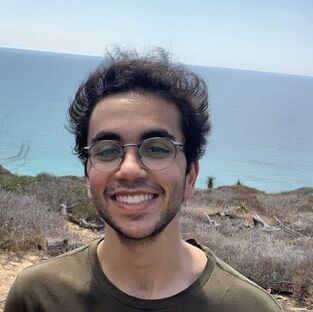 Danny Rayes, B.S.
Danny Rayes, B.S.
Graduate Student (M.S.)
Danny Rayes is a microbiology major who joined the lab in January of 2022 and is currently working on fluoroscent sex sorting methods to use in conjunction with pgSIT. He is also interested in gene editing techniques and environmental conservation.
Contact: [email protected]
Danny Rayes is a microbiology major who joined the lab in January of 2022 and is currently working on fluoroscent sex sorting methods to use in conjunction with pgSIT. He is also interested in gene editing techniques and environmental conservation.
Contact: [email protected]
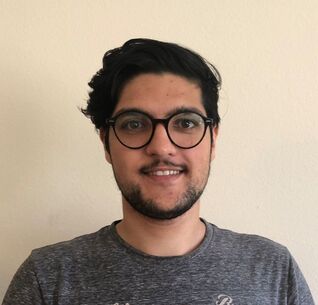 Dylan Turksoy, B.S.
Dylan Turksoy, B.S.
Graduate Student (M.S.)
Dylan completed his undergraduate studies in UC San Diego with a major in Microbiology shortly before he joined the Akbari Lab in July 2022 to pursue his Masters Degree. He is interested in gene editing and discovering molecular techniques to help reduce the spread of vector borne diseases in mosquitoes. His research involves improving the efficiency of sex-sorting and discovering the interaction between different genes involved in the sex determination pathway of Aedes aegypti.
Contact: [email protected]
Dylan completed his undergraduate studies in UC San Diego with a major in Microbiology shortly before he joined the Akbari Lab in July 2022 to pursue his Masters Degree. He is interested in gene editing and discovering molecular techniques to help reduce the spread of vector borne diseases in mosquitoes. His research involves improving the efficiency of sex-sorting and discovering the interaction between different genes involved in the sex determination pathway of Aedes aegypti.
Contact: [email protected]
Lab Assistants (LA)
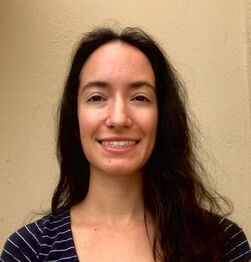 Ava Stevenson, B.S. Ava Stevenson, B.S.
Ava Stevenson received her B.S. in Biology from the University of California Riverside in June 2022. Before working in the Akbari lab, she worked in the McFrederick lab at UCR studying bumble bee microbiomes. Contact: [email protected] |
Tianqi Wang received her B.S. in General Biology from the University of California, San Diego (2023). She joined the Akbari Lab as an undergraduate researcher in June 2021. She focuses on CRISPR-based technologies for the surveillance and control of gene drives and vector-borne pathogens. Contact: [email protected] |
 Nikolay Kandul, Ph.D.
Nikolay Kandul, Ph.D.
Visiting Scholar
Dr. Kandul grew up in Russia, was educated in Russia and USA, and received his Ph.D. from Harvard University. As a student, he was interested in evolution and was studying the role of chromosomal rearrangements in origins of new butterfly species. Later Dr. Kandul became interested in engineering genetic tools in model organisms with an ultimate goal to address applied biological questions and societal challenges. At Caltech, he developed an innovative approach to engineer specific mitochondrial DNA (mtDNA) mutations in a fraction of mtDNA, and showed that irreplaceable muscle fibers have a capacity to selectively remove mutant mtDNA, rejuvenate themselves, and slow aging at the cellular level. Now, at the UC San Diego, he is developing novel technologies to suppress or replace insect populations, such as the precision guided Sterile Insect Technique (pgSIT) and CRISPR-mediated gene drives, to tackle insect threats to food security and spread of vector-borne diseases.
Contact: [email protected] Google Scholar Click here for current CV
Dr. Kandul grew up in Russia, was educated in Russia and USA, and received his Ph.D. from Harvard University. As a student, he was interested in evolution and was studying the role of chromosomal rearrangements in origins of new butterfly species. Later Dr. Kandul became interested in engineering genetic tools in model organisms with an ultimate goal to address applied biological questions and societal challenges. At Caltech, he developed an innovative approach to engineer specific mitochondrial DNA (mtDNA) mutations in a fraction of mtDNA, and showed that irreplaceable muscle fibers have a capacity to selectively remove mutant mtDNA, rejuvenate themselves, and slow aging at the cellular level. Now, at the UC San Diego, he is developing novel technologies to suppress or replace insect populations, such as the precision guided Sterile Insect Technique (pgSIT) and CRISPR-mediated gene drives, to tackle insect threats to food security and spread of vector-borne diseases.
Contact: [email protected] Google Scholar Click here for current CV
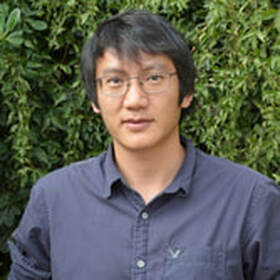 Ming Li, Ph.D.
Ming Li, Ph.D.
Visiting Scholar
Ming Li received his B.S (2006) and M.S. (2009) in Plant Protection and Insecticide Resistance, respectively, from Southwest University of China, Chongqing. He then moved to the United States to purse his Ph.D in Entomology at Auburn University and graduated in 2014. A postdoctoral scholar in the Akbari lab since January 2016, he is currently developing gene drive and suppression techniques in mosquitoes.
Contact: [email protected] Google Scholar Click here for current CV
Ming Li received his B.S (2006) and M.S. (2009) in Plant Protection and Insecticide Resistance, respectively, from Southwest University of China, Chongqing. He then moved to the United States to purse his Ph.D in Entomology at Auburn University and graduated in 2014. A postdoctoral scholar in the Akbari lab since January 2016, he is currently developing gene drive and suppression techniques in mosquitoes.
Contact: [email protected] Google Scholar Click here for current CV
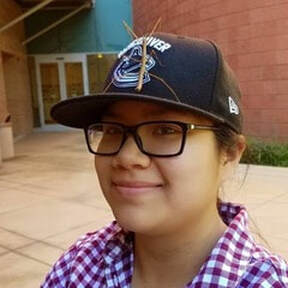 Michelle Bui, Ph.D.
Michelle Bui, Ph.D.
Visiting Scholar
Michelle Bui received her B.S. in Entomology at the University of California, Riverside (2016), and Ph.D from UCSD in 2023. She is interested in developing novel vector control tools and methodologies as well as further understanding arthropod biology using genetic and molecular approaches.
Contact: [email protected] Google Scholar Click here for current CV
Michelle Bui received her B.S. in Entomology at the University of California, Riverside (2016), and Ph.D from UCSD in 2023. She is interested in developing novel vector control tools and methodologies as well as further understanding arthropod biology using genetic and molecular approaches.
Contact: [email protected] Google Scholar Click here for current CV
Undergraduate Student Researchers
 Martha Chow Martha Chow
Martha majors in Molecular and Cell Biology and will be graduating from UC San Diego in 2023. She joined the Akbari lab in 2022 hoping to learn more about the intersection between synthetic biology and insect control. Contact: [email protected] |
 Akshay Bharadwaj Akshay Bharadwaj
Akshay is a Microbiology Major planning to graduate in 2024. He joined the lab in February 2024 and is particularly interested in utilizing CRISPR based technologies to limit the spread of insect-borne diseases such as malaria.
Contact: [email protected] |
 Dhara Desai Dhara Desai
Dhara Desai is a Human Biology major planning on graduating from UC San Diego in 2024. She joined the Akbari Lab in March 2022 as an undergraduate researcher. She is interested in learning about the temperature-inducible PgSIT (TI-PgSIT) technique and applying it to Aedes albopictus to develop an efficient mosquito population suppression technology. Contact: [email protected] |
 Claire Lin Claire Lin
Claire Lin is a Human Biology major planning on graduating from UC San Diego in 2024. Claire joined the Akbari Lab in August 2021 as an undergraduate researcher. She is interested in the application/advancement of gene-editing technologies to mitigate the spread of disease. Contact: [email protected] |
 Carly Chang Carly Chang
Carly Chang is a biochemistry major at UC San Diego graduating in 2025. Carly joined the Akbari Lab in October 2021 as an undergraduate researcher working with D. Melanogaster. She is interested in the prevention of diseases through genetic engineering techniques. Contact: [email protected] |
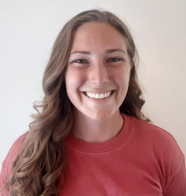 Hannah Schmidtler Hannah Schmidtler
Hannah Schmidtler is a Human Biology major at UC San Diego who will graduate in 2024. She joined the Akbari Lab in September 2022 as an undergraduate researcher. She is interested in using genetic engineering and synthetic biology to address mosquito-borne pathogens. Contact: [email protected] |
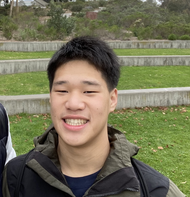 Elvin Luu Elvin Luu
Elvin Luu is a Human Biology major who plans to graduate in 2026. He joined the Akbari Lab in October 2022 with an interest in novel mosquito control techniques. Elvin looks forward to learning more about the field of gene engineering. Contact: [email protected] |
 Sansa Chen Sansa Chen
Sansa (Sanle) Chen is a molecular and cell biology student planning to graduate in 2025. She joined the Akbari Lab in March 2022 as an undergraduate researcher. She is interested in applying gene editing techniques to prevent mosquito-borne diseases. She is working on Anopheles gambiae. Contact: [email protected] |
 Shreya Krishnan Shreya Krishnan
Shreya Krishna will graduate from UC San Diego with a B.S. in Human Biology in 2024. Shreya joined the Akbari Lab in October 2021 as an undergraduate researcher working with the lab's molecular genetics procedures. She is interested in genetically engineering mosquito lines to mitigate insect-borne disease in humans.
Contact: [email protected] |
 Omid Jamshidi Omid Jamshidi
Omid Jamshidi is currently a fourth year microbiology student who will graduate in 2023 with a BS in Microbiology at UC San Diego. He joined the Akbari Lab in October 2021 and is interested in providing tangible solutions that utilize bioinformatic information paired with gene-altering techniques to prevent the transmission of vector-borne diseases. Contact: [email protected] |
 Cecilia Hurlbert Cecilia Hurlbert
Cecilia Hurlbert is a currently pursuing a BS in General Biology with a minor in Global Health at UC San Diego and expects to graduate in 2024. Cecilia joined the Akbari Lab in 2021 and is focused on developing effective applications of the Precision-Guided Sterile Insect Technique (pgSIT) to vectors of neglected diseases. She is also interested in the diversification of genome studies and research.
Contact: [email protected] |
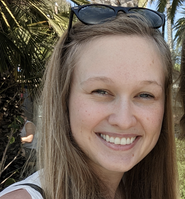 Julika Job Julika Job
Julika is a Molecular and Cell Biology major who will be graduating from UC San Diego in 2024. She joined the Akbari Lab as an undergraduate researcher in June of 2023. She is interested in applying genetic engineering techniques to reduce the spread of vector-borne diseases. Contact: [email protected] |
|
Simon Joseph is a Bioengineering: Biotechnology major graduating in 2026. He joined the lab in spring of this year. He is interested in uses of genetic engineering that promote human health and equity. Malarial vector control is undoubtedly one of those.
Contact: [email protected] |
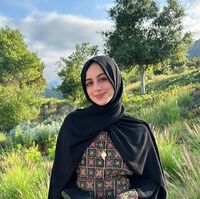 Mahlak Abdullah Mahlak Abdullah
Mahlak Abdullah is a fourth year undergraduate student studying Human Biology. She joined the Akbari lab in Summer July 2023. Her interests lie in the fields of molecular biology research, bioinformatics, and aerospace. She is interested in exploring how gene editing and manipulation can reduce the transmission of vector borne diseases.
Contact: [email protected] |
 Antara Bhatt Antara Bhatt
Antara Bhatt is 3rd year biochem major studying at UC San Diego currently. Also an aspiring MD, passionate about serving the society and community at large. She joined the akbari lab before summer of 2023. Primarily helps sex sort mosquitos. Contact: [email protected] |
 Ingrid Ding Ingrid Ding
Ingrid (Qiaoying) Ding is Human Biology major at UC San Diego planning to graduate in 2024. She joined the Akbari lab in September 2022 as a undergraduate volunteer. She is interested in using gene editing techniques to control vector-borne diseases and mosquito reproduction.
Contact: [email protected] |
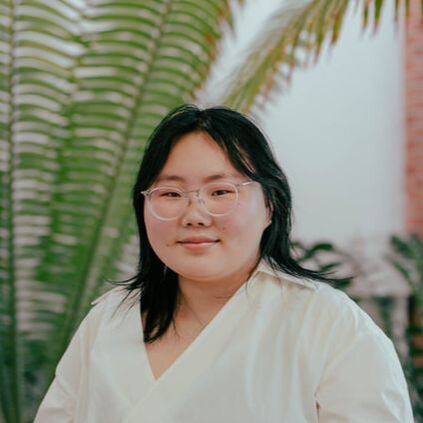 Annie Kim Annie Kim
Annie Kim is majoring in Molecular and Cell Biology with a minor in Global Health at UC San Diego, and she is expected to graduate in 2024. In September 2022, Annie joined the Akbari Lab as an undergraduate researcher. Her research interests lie in the application and development of genetic engineering techniques for controlling vector-borne diseases.
Contact: [email protected] |
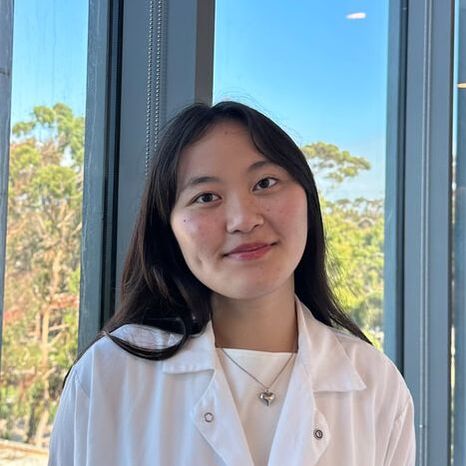 Leyna Nguyen Leyna Nguyen
Leyna Nguyen is a third year undergraduate majoring in Molecular and Cellular Biology. She joined the Akbari Lab in July 2023 as an undergraduate research volunteer. In specifics, she is interested in both the molecular and social research of infectious diseases. Being in the Akbari Lab spiked her interests in using gene editing as a means to reduce the spread of vector-borne diseases.
Contact: [email protected] |
 Connor Gerry Connor Gerry
Connor Gerry is a fourth year biochemistry major at UCSD. He joined the lab in late summer 2023 as an undergraduate volunteer. He assists in research on the interactions between genes in the sex-determining pathway in Aedes aegypti.
Contact: [email protected] |
 Rini Khatuya Rini Khatuya
Rini Khatuya plans to graduate from UC San Diego in 2025 as a Human Biology major with a Global Health minor. She joined the Akbari lab in August 2023 as an undergraduate research volunteer. Rini is interested in varied approaches to preventative health, including responsible gene editing as a tool to reduce vector-borne disease morbidity.
Contact: [email protected] |


